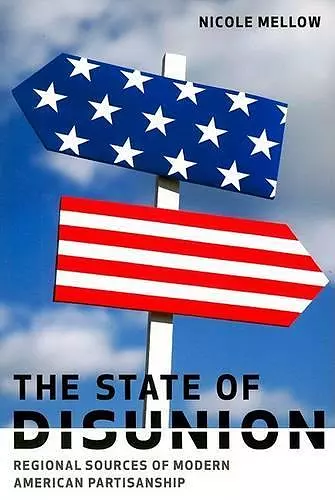The State of Disunion
Regional Sources of Modern American Partisanship
Format:Paperback
Publisher:Johns Hopkins University Press
Published:23rd May '08
Currently unavailable, and unfortunately no date known when it will be back

This is a well-written discussion of the continuing and growing significance of political geography in American politics, and a reminder that regions are politically defined by more than their economic characteristics. Professor Mellow focuses on issues that are of particular relevance to the contemporary era. -- James G. Gimpel, University of Maryland, College Park Rather than strengthening American democracy, Mellow argues, nationalized partisanship has fractured it. With meticulous research and subtle analysis, this book comes to a provocative conclusion: nearly a century and a half after the Union was preserved, the country is once again at risk of becoming a 'house divided against itself.' -- Sidney M. Milkis, University of Virginia An insightful and important book. By analyzing congressional voting patterns on key issues (trade, welfare, abortion) within broad historical contexts, Mellow illuminates how politicians' strategies, responding to changes in the economies and cultures of geographic regions, can destroy old national party systems, create new ones, and sharpen partisan polarization. -- Ben Page, Northwestern University This important book spans American history, economics, and culture to explain why the nation splits into blue versus red states. Nicole Mellow suggests that the regional differences may be growing and warns us about the consequences for our democracy. Wise, ambitious, elegant, alarming, and highly recommended. -- James A. Morone, Brown University
Mellow offers a new way to comprehend the meaning and significance of American partisanship for our time and for the future.Why are some eras of American politics characterized by broad, bipartisan harmony and others by rancorous partisanship? In The State of Disunion, Nicole Mellow argues that these oscillations are a product of how the two major parties respond, or fail to respond, to the demands of regional constituents. While scholars have long believed that in the twentieth century the nation supplanted regions as the engine of American politics, Mellow uncovers a contrary dynamic. She shows the ways that the clashes and confluences of regional interests reconstruct the nation. By giving regions pride of place, The State of Disunion offers a compelling explanation of how America went from the consensus of the early post-World War II decades to a fractured, "red versus blue" country at the close of the twentieth century. According to Mellow, regions remain a vital consideration in electoral battles because they fuse material and ideological expectations of voters. This wide-ranging analysis of congressional battles over trade, welfare, and abortion since the 1960s demonstrates how regional economic, racial, and cultural divisions have configured national party building and today's legislative conflicts and how these divisions will continue to shape American politics for years to come. The State of Disunion broadens social scientists' understanding of American politics by displaying the conceptual insights of political geography combined with the rich tapestry of political history. Mellow offers a new way to comprehend the meaning and significance of American partisanship for our time and for the future.
Mellow gives a valuable account of the political economy of the shift, linking regional differences in congressional votes on trade, welfare, and abortion to changes in regional political economy, particularly the move of industry from the North and Pacific to the South and interior West. Choice 2008 A solid study of how region affects partisanship in contemporary America. -- Gregory L. Schneider Annals of Iowa 2009 Mellow's work offers important insights into the development of the American party system and will help us understand its future. We should keep her thesis in mind. -- Andrew Reeves Political Science Quarterly 2010
ISBN: 9780801888168
Dimensions: 229mm x 152mm x 15mm
Weight: 318g
240 pages